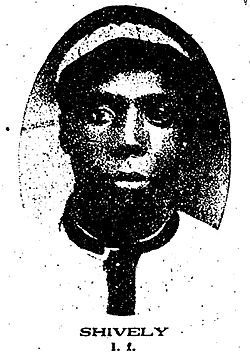George Shively facts for kids
Quick facts for kids George Shively |
|||
|---|---|---|---|
 |
|||
| Left fielder | |||
| Born: January 3, 1893 Lebanon, Kentucky |
|||
| Died: June 7, 1962 (aged 69) Bloomington, Indiana |
|||
|
|||
| debut | |||
| 1910, for the West Baden Sprudels | |||
| Last appearance | |||
| 1924, for the Washington Potomacs | |||
| Teams | |||
|
|||
George "Rabbit" Shively (born January 3, 1893 – died June 7, 1962) was a talented American baseball player. He was known as a left fielder in the Negro leagues. George played baseball from 1910 to 1924, joining many different teams. He spent most of his career with the Indianapolis ABCs.
Contents
Discovering George "Rabbit" Shively
George Shively was born in Lebanon, Kentucky. He grew up to become a professional baseball player. His nickname "Rabbit" likely came from his speed or quick movements on the field. He played during a time when baseball was segregated in the United States.
Playing in the Negro Leagues
The Negro leagues were professional baseball leagues for African American players. These leagues existed because Black players were not allowed to play in Major League Baseball until 1947. The Negro leagues were full of amazing athletes and exciting games.
His Amazing Baseball Journey
George Shively started his career in 1910 with the West Baden Sprudels. He later played for the Leland Giants and then returned to the Sprudels. From 1914 to 1918, he was a key player for the Indianapolis ABCs.
In 1919, George took on a new role. He became the captain of the "Lyon's Black Devils" team in Kokomo, Indiana. After that, he moved to the East Coast. He played for teams like the Atlantic City Bacharach Giants, the Brooklyn Royal Giants, and the Washington Potomacs. He continued playing until 1924.
Remembering a Baseball Hero
George Shively passed away in 1962. He was buried in an unmarked grave in Bloomington, Indiana. Years later, in 2015, a special ceremony took place. A beautiful limestone monument was placed on his gravesite in Rosehill Cemetery. This event honored George Shively and ten other African Americans who were also buried without markers. It was a way to remember their contributions and ensure their stories are not forgotten.
 | Laphonza Butler |
 | Daisy Bates |
 | Elizabeth Piper Ensley |

